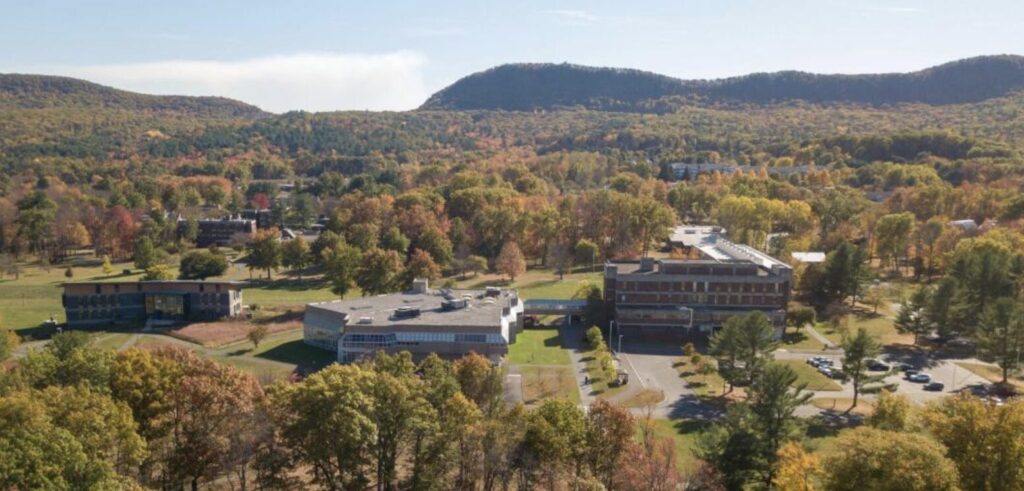Opinion: Hampshire College at a Crossroads, Part 1

Hampshire College. Photo: hampshire.edu

Some may be aware that Hampshire College is in the midst of a presidential search. This is a high-stakes moment, full of opportunity and risk; the wrong choice now could mean the end of Hampshire College.
After the community rallied to change Hampshire’s direction following a near closure in 2019, the recovery is faltering. Hampshire needs excellent leadership and a new direction.
Hampshire can move beyond endless cost-cutting, a strategy that was necessary in the short term but lacked some key elements needed for a turnaround. I write more about why Hampshire needs a new business model in upcoming part two: “Hampshire Needs to Rethink Higher Ed, Again?” An exciting alternative vision will also help attract excellent presidential candidates, but first, Hampshire should address some key flaws in its search process.
Qualities Needed in the Next President
Mike Bills, who has been a trustee for two different colleges, wrote in his dissertation about the different types of leadership needed in various stages of a college’s recovery. The problem with Hampshire’s leadership since the 2019 crisis is that it has adhered to the crisis manager prototype instead of demonstrating flexibility to return to shared governance, deferring on a case-by-case basis to those with more time, knowledge, or skills related to a particular issue. Good leaders skillfully calibrate between hierarchy and collaboration depending on the type of issue and level of urgency.
Besides a strong fundraising background at small liberal arts colleges, leaders should have knowledge of their own weaknesses and a demonstrated ability to compensate for that by delegating to others. Many agree that it’s rare to find all the necessary skills to be a successful college president in one person. There are various ideas for splitting up the functions among several roles. I go into more details and link to a report in the presidential search section of the article “Is Hampshire Still Hampering Good Governance?”
Presidential Search
On January 6 of this year, President Wingenbach announced that the interim president would start on July 1st, but he didn’t state that she would be in the running for the permanent position. It wasn’t until an open webinar that it was announced that Chrisler was in the running. Unfortunately, research shows that an interim president becoming a candidate can have a highly problematic effect on the search process. Hampshire has had a flawed process in the past.
Rewind – 2017/2018 Presidential Search
The 2018 search committee chose Mim Nelson. Her term was a disaster and nearly led to the college’s closure; she resigned after serving less than a year. I spoke with several committee members and found that they were intelligent, diligent, and cared about the process and Hampshire. So what led to such a terrible pick, and what can be done differently?
Hampshire had a search committee in 2017 that didn’t end up selecting a finalist and was reconstituted into a second committee with changes to its leadership and some of its members. Some felt pressure to choose someone because of the realities of what could happen if they went back to the drawing board: some candidates might drop out, better candidates might not emerge, and it would look bad, as the search had already been extended. Since the current selection could be as existentially impactful for the college as the one in 2018, we need to fix current problems in the process.
Committee Composition
Dr. Christopher Tinson, a member of the 2017/18 committee, told me that he thought the presidential search committee should comprise close to the same number of faculty as trustees. Hampshire’s board has a couple of trustees elected by the alumni body, but most are selected by the board itself. I notice that the current committee is skewed: neither of the two trustees elected by the alumni body is on the committee, and trustees still outnumber faculty. The article “Colleges in Peril Can Be Rescued, but Only if Governing Boards Transform” discusses some of the issues with the composition of college boards.
Mim Nelson Playbook and the Dire Need for Better Vetting
Hampshire doesn’t conduct “open” searches for president, which means that candidates are promised anonymity. The idea behind this is to encourage top candidates who wouldn’t otherwise apply because it could endanger their current job. This secrecy puts more of the onus on skillful vetting since those who know more about the candidates can’t warn the committee before the selection is announced.
Dr. Jaime Dávila, who was on the 2017/18 search committee and now teaches at the University of Massachusetts Amherst, told me that, “There were interesting differences from which we could then choose what was important…You have to remain committed to what’s essential, especially at a place like Hampshire. So someone that could lead an institution and a community through change was important. And she [Nelson] had, in her time, led institutions through some changes.” This was reasonable thinking because Hampshire did need to change.
The Hampshire community received an anonymous tip-off with the heading “Mim Nelson Playbook” and details about what happened at the Thomson School through a sharing of this Reddit post. At Thomson School, a reimagining process was undertaken that purported to be inclusive but actually masked the dismantling of most of the program. It appears that her interim leadership there was part of what Hampshire’s committee saw as her being an experienced leader of academic change and dealing with challenging budgetary issues.
Unfortunately, it was too late—since the tipster had no way to know that she was in the running for the Hampshire presidency, the warning came only after her appointment was announced. This post should have been discovered through proactive vetting; it could have raised serious doubts about her story as an educational reformer, leading to fact-checking of the allegations.
Another challenge for vetting is that the search firms are not incentivized to communicate about seemingly minor flaws. These firms may not see one hire as existential for the college; typically, their goal is to get their placement fee and move on by finding an adequate candidate who will work out for a few years. The college’s own stakeholders have a better understanding of Hampshire’s unique culture. The search committee itself or special advisors, with deep experience both with Hampshire’s culture and recruiting in general, should handle reference checks and online searches to confirm information relevant to candidates’ job performance, especially for the finalists. Reasonable concerns can then be passed on to the committee and subcommittees.
Subcommittees
Loren Pope wrote in his 1996 book, Colleges That Change Lives, that “Hampshire students have built-in crap detectors,” which remains true to this day. The key is not simply to include them on the main committee, but to have a separate, empowered subcommittee for each stakeholder group (students, alumni, faculty, and staff). Each subcommittee would separately interview the candidates and submit its own report to the main committee. This separation is to prevent problems like students hesitating to push back on faculty opinions in a mixed group.
Interim Becomes Candidate
A trustee announced that Chrisler is in the running during an open webinar in August. While Chrisler has provided a steady hand and continuity through the interim presidency, an interim president running for the permanent position can create a host of problems. It’s obvious to other potential candidates that the interim president has a homefield advantage, such as established relationships with the board, influence on timing of media outreach, on-campus events, one-on-ones, and webinars. Chrisler’s candidacy may also benefit from large donations that happen to come in this fall, coinciding with the 55th anniversary of the college.
A Mandate for More Interim Presidents highlights some of the problems associated with including an interim president in the search for a permanent one. Ideally, the board should have first identified whether there were strong internal candidates that should have been considered instead of having a costly national search.
Hampshire has used a firm called The Registry in the past, according to an IRS filing. The Registry specializes in higher education and their website states that the firm has placed more senior leaders than any other organization in the country. In “The Age of Interims: Temporary Appointments are Everywhere. The Costs are Real,” Kevin J. Matthews, who was their CEO, said, “The Registry strongly discourages its interims from competing for the permanent positions so they will not be influenced by a desire for the job.”
Hampshire is a member of the American Association of Governing Boards of Colleges and Universities (AGB). In Presidential Search: An Overview For Board Members, AGB wrote, “Many experts suggest that interim presidents serve best when they are not candidates for the permanent position; some boards stipulate this arrangement in the interim president’s contract.”
In Trusteeship, AGB’s magazine, Robert Hastings Perry wrote, “In other situations, trustees are unprepared to lose their president and are taken by surprise. Faced with the daunting task of launching a search without the benefit of a game plan, the board often acts precipitously. Believing that the office should not be vacant, they appoint an acting president, logically the institution’s No. 2 administrator. What is essential at this point—and in many cases completely overlooked—is a determination of whether that individual will be a candidate for the permanent post. Simply put, if the acting president is permitted to be a candidate, the process will suffer greatly, as will the institution.
But far more serious than these internal obstacles is the negative effect on the external marketplace. The message from the university and its search counsel that the process is open and all-inclusive falls on deaf ears. The best prospective candidates, believing the search is wired, choose not to apply or to accept nominations. There can be at least two results: The final slate of candidates is missing the horsepower it otherwise would have had, or the institution and search counsel lose face because of the perception that they cooperated in a sham.”
Hampshire should:
- Implement the reforms suggested above
- Withdraw the interim president from the race
- Task a volunteer committee of alumni with marketing the position to widen the candidate pool
- Include the opportunity for reforming the business model in the job profile, to attract superb candidates
These reforms will provide a process with more integrity and maximize the chances of finding a great match. If the search doesn’t work out, the board would still have the option of offering the position to the interim president or relaunching the search later on.
The upcoming part two: “Hampshire Needs to Rethink Higher Ed, Again?” provides further details on what Hampshire needs to do to thrive.
Jonathon Podolsky is a Hampshire alum, journalist member of the Education Writers Association, and a Boardsource Certified Nonprofit Board Consultant. More at www.Podolsky.cc
